For the first time in history, a defendant has agreed to use artificial intelligence (AI) to defend themself in court. Admittedly, the stakes aren’t that high. The defendant will be fighting a speeding ticket — not exactly a capital offence. So, what’s all the fuss about? Freelance writer Jennifer Asencio explains, “This will be the first time that artificial intelligence is used in this capacity as it is illegal to use technology this way in many places.”[1] She also notes the identity of the defendant in the first case has been kept secret for privacy reasons. I’m sure lawyers, prosecutors, and judges will be watching this case closely.
You might be wondering why someone whose company is primarily focused on the consumer packaged goods (CPG) industry would be writing about an AI lawyer. There are a couple of reasons. First and foremost, Enterra Solutions® is an AI company — so all things AI-related are of interest to me. Secondly, the AI robot in question uses natural language processing (NLP) and its ability to argue logically has broader applicability beyond the confines of the courtroom.
Meet the AI Lawyer
The AI lawyer doesn’t have a name. It’s an app created by a company called DoNotPay. According to journalist Sirisha Pamidimurthala, “DoNotPay was launched in 2015 by Joshua Browder, a Stanford University Computer Science grad, as a chatbot that can help with giving legal advice in cases such as paying late fees and fines. It slowly evolved into an AI based application in 2020.”[2] Browder says it took a long time for the app “to learn the nuances of law, procedures and the wide range of topics. He said they took all sort of measures to make the app only [makes] arguments based on facts. ‘We’re trying to minimize our legal liability. And it’s not good if it actually twists facts and is too manipulative’, said Browder.” Asencio reports, “The company has also promised to pay any legal fees and fines that are incurred if the advisor cannot perform its job in court.” The first test case for the application is reportedly going to be a Zoom courtroom appearance by the defendant. The app will run on a smartphone, listen to everything being said, and, based on what it hears, provide advice to the defendant through an earpiece.
Letting AI assume the role of lawyer, which could metaphorically kill the profession, is probably not what William Shakespeare had in mind when he wrote, “The first thing we do, let’s kill all the lawyers.” Nevertheless, Pamidimurthala reports, “Like a seasoned lawyer, [the DoNotPay app] knows how not to react to everything that transacts in the court. It listens the arguments first and only then delivers the instructions. Browder opines it has potential for giving lawyers a run for their money. He adds, ‘It’s all about language, and that’s what lawyers charge hundreds or thousands of dollars an hour to do.'” The company’s website states, “Fight corporations, beat bureaucracy, and sue anyone at the press of a button.” In a country some people believe is already too litigious, the DoNotPay app will likely receive a mixed reception.
Beyond the Courtroom
Science writer Ameya Paleja explains that DoNotPay was primarily created to help consumers fight unwarranted charges and poor customer service by large corporations. He explains, “DoNotPay is an AI solution that is aimed at helping individuals fight against large organizations for acts such as applying wrong fees, persistent robocalling, or even fighting parking tickets. According to the company, most of these cases are winnable for individuals but appeals fall by the wayside since defendants cannot afford high legal fees or do not have the time and resources to fight bureaucracy. DoNotPay wants to offer its AI-trained program as the means to fight these situations while also saving you time from lengthy conversations with customer care when you wish to cancel a subscription. If the organization can ask you to jump the hoops through the Interactive Voice Response System (IVRS) when you call, DoNotPay can provide you with the ideal solution with an intelligent responder.”[4]
Does it work? There is anecdotal evidence that it does. Tech journalist Lauren Leffer reports, “Even in its earliest incarnations, the bot was a success. In less than two years, DoNotPay successfully contested 160,000 parking tickets in New York and London. And the company claims it has resolved 2 million cases total since its founding. Then, in 2020, with the release of ChatGPT, the company shifted its focus to AI and upped its potential.”[5] In a promotional video, Browder explains he started the company because of all the parking tickets he was receiving while a student at Stanford. In the video, he says he wants to be the general counsel for consumers and make big organizations think twice before ripping consumers off.
Concluding Thoughts
The use of ChatGPT for the DoNotPay app is problematic. After ChatGPT went public late last year, tech journalist Benj Edwards (@benjedwards) tweeted, “It’s possible that OpenAI invented history’s most convincing, knowledgeable, and dangerous liar — a superhuman fiction machine that could be used to influence masses or alter history.” ChatGPT also has the ability to answer questions factually, which has created a bit of worry in educational circles, and may change Internet search engine results in the near future. It would seem that Browder is on to something. Although he started DoNotPay as a consumer tool, manufacturers and suppliers could also use the tool as part of their efforts to challenge chargebacks and other compliance issues. It could also be used to help large companies improve their customer service. The world is changing and AI is helping change more rapidly.
Postscript: I don’t normally revise previously published articles. Nevertheless, this article deserves an update. The furor created DoNotPay’s attempt to help a defendant in court drew so much ire from the legal profession that Browder called a halt to the plan. Journalist Mariella Moon reports, “The CEO told NPR that multiple state bar associations had threatened his company, and one even said he could be imprisoned for six months. He told the media organization: ‘Even if it wouldn’t happen, the threat of criminal charges was enough to give it up. The letters have become so frequent that we thought it was just a distraction and that we should move on.’ While the State Bar of California refused to talk about DoNoPay’s situation, it told NPR that it has a duty to investigate potential instances of unauthorized law practice.”[6]
Footnotes
[1] Jennifer Asencio, “Artificial Intelligence To Become Lawyer In Court Case,” Giant Freakin Robot, 7 January 2023.
[2] Sirisha Pamidimurthala, “First time in History! An AI Robot to defend a human in Court,” Analytics Insight, 6 January 2023.
[3] William Shakespeare, Henry VI, Part 2, Act IV, Scene 2.
[4] Ameya Paleja, “In a world first, AI lawyer will help defend a real case in the US,” Interesting Engineering, 6 January 2023.
[5] Lauren Leffer, “DoNotPay’s ‘Robot Lawyer’ Is Gearing Up for Its First U.S. Court Case,” Gizmodo, 7 January 2023.
[6] Mariella Moon, “Jail threats stop AI ‘robot lawyer’ from making its debut in court,” Engadget, 26 January 2023.





